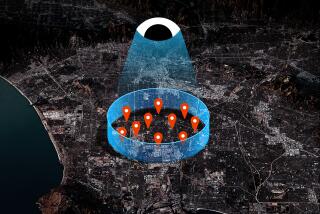NSA does not collect cellphone location data, officials say

The U.S. Justice Department has told a court in Florida that the government does not secretly track the location of Americans’ cellphones as part of its massive phone surveillance dragnet, but asking experts to believe that assertion has proved to be another matter.
The basic privacy question raised in the recent revelations -- has the government been tracking American phone users? -- remains muddied by a vaguely worded, top-secret court order and an ensuing series of carefully worded denials.
The Justice Department’s response -- declining to release secret tracking data on phone locations because it purportedly doesn’t have it -- almost immediately raised new questions.
“Unfortunately, getting meaningful answers to these questions is a lot like getting a genie to grant your wishes,” said Matt Blaze, an associate professor at the University of Pennsylvania who specializes in electronic security.
The recent leak of a secret court order for Verizon to hand over millions of Americans’ cellphone records -- including whom phone users were calling and for how long -- prompted a privacy backlash against what officials later publicly confirmed was a wide-ranging, long-running National Security Agency program.
After the leak, a Florida defense attorney, Marshall Dore Louis, went so far as to say that phone location data held by the NSA might help his client’s defense in a criminal case, in which similar data had been used by prosecutors to implicate his codefendants in a series of robberies.
His client’s phone company, MetroPCS, didn’t keep phone location data dating back to 2010, so Louis, citing the leaked court order, said the NSA might be the only entity that still held the old records and thus had an obligation to turn them over.
The government’s response to Lewis’ request, filed with the court last Wednesday, says the NSA does not have such a capability: The agency didn’t collect location data under the phone surveillance program, so there were no records to turn over, the court filing said.
“The program described in the classified [Foreign Intelligence Surveillance Act court] order cited by the defense did not acquire such data,” the filing stated, adding that “the government has no reason to believe” location data were being held by the government that could be turned over for the criminal case.
Deputy Atty. Gen. James Cole made a similar statement about the limits of the phone metadata program at a U.S. House Intelligence Committee hearing last Tuesday.
“This is just like what you would get in your own phone bill,” Cole testified. “It is the number that was dialed from, the number that was dialed to, the date and the length of time. That’s all we get. ... We don’t get any cell site or location information as to where any of these phones were located.”
But surveillance experts still found themselves poking through the officials’ latest statements and looking for trap doors and subtle elisions, checking to see whether the government had camouflaged wide-ranging surveillance capabilities behind a few carefully worded denials.
Much of the uncertainty regarding the government’s latest statements resides in the original FISA court order to Verizon. The top-secret order, issued in April, compelled Verizon to turn over “all call detail records,” including “comprehensive communications routing information.”
Specialists queried by the Los Angeles Times couldn’t say with certainty whether the language used in the order meant that Verizon was clearly compelled to turn over location data to the government, though many assumed location data would normally be included in such a broadly worded request.
“Given that the FISA Court order says that the government can have location data, it’s quite odd to hear the government claim that it doesn’t ‘collect’ that data,” said Susan Landau, a former Sun Microsystems engineer and an expert on digital surveillance.
“They certainly have the technical capacity and assert they have the authority,” said Kurt Opsahl, a senior staff attorney with the Electronic Frontier Foundation, a privacy advocacy group. “Given the history of deceptive and misleading statements from the [national intelligence director], I cannot take the government at its word that, despite its technical capacity and belief in its authority, it simply chooses not to track location.”
Mark Rasch, a former federal cyber-crime prosecutor and the owner of a technology and cyber-law company based in Bethesda, Md., said the original FISA order and the government’s response in the Florida robbery case are ambiguous.
Yet Rasch said he was inclined to believe the government’s assertion that it wasn’t collecting Americans’ phone location data on a massive scale. He cited a declarative statement in the government’s denial in the robbery case: “The government does not possess the records the defendant seeks.”
“That’s pretty unequivocal,” Rasch said -- adding that an admission that the government does not track cellphone users’ locations could cause more damage to American national security than Edward Snowden’s initial leaks outlining the extent of the NSA’s surveillance capabilities.
“What’s important in these programs is not what the government reveals [about] what it’s doing. It’s more important for them to reveal what they’re not reviewing,” Rasch said. “Up until this court order, I would have assumed the government was collecting phone location data. This admission is significant.”
But from a national security perspective, how useful would a backward-looking trove of Americans’ phone location data really be? Allan Friedman, research director of the Center for Technology Innovation at the Brookings Institution, noted that federal law enforcement officials can easily monitor the phones of terrorism suspects using traditional legal methods.
Friedman said there are two schools of thought about how the NSA could use its massive phone records database: Officials could look for patterns and try to predict developing threats; or they could use it as a kind of library to seek older records on specific suspects.
“Why is location data valuable? It’s very valuable if you have a suspect and you want to show they were there at this point in time. You want to demonstrate something has happened and eliminate alibis,” Friedman said. But it tends to be more useful for criminal investigators piecing together something that has already happened than for spies trying to learn more about a subject, he said.
That, of course, is precisely what the defense in the Florida case was hoping to achieve.
Nonetheless, the ongoing uncertainty about the NSA’s powers is a problem the government brought on itself, Friedman said.
“We actually do need some amount of precision about what is being collected, and the means to avoid being asked those question is to limit your investigations,” Friedman said. “The government has made their own bed in terms of raising these questions. These aren’t a few questions extremists are raising. This is something everyone wants to know about.”
ALSO:
Zimmerman murder trial begins with drama, spin
Colorado blaze grows, but homes unscathed so far
Nik Wallenda survives tightrope walk over gorge near Grand Canyon
More to Read
Sign up for Essential California
The most important California stories and recommendations in your inbox every morning.
You may occasionally receive promotional content from the Los Angeles Times.











